- Home
- Don DeLillo
Point Omega Page 2
Point Omega Read online
Page 2
Jerk.
It felt real, the pace was paradoxically real, bodies moving musically, barely moving, twelve-tone, things barely happening, cause and effect so drastically drawn apart that it seemed real to him, the way all the things in the physical world that we don’t understand are said to be real.
The door slid open and there was a stir of mild traffic at the far end of the floor, people getting on the escalator, a clerk swiping credit cards, a clerk tossing items into large sleek museum bags. light and sound, wordless monotone, an intimation of life-beyond, world-beyond, the strange bright fact that breathes and eats out there, the thing that’s not the movies.
1
The true life is not reducible to words spoken or written, not by anyone, ever. The true life takes place when we're alone, thinking, feeling, lost in memory, dreamingly selfaware, the submicroscopic moments. He said this more than once, Elster did, in more than one way. His life happened, he said, when he sat staring at a blank wall, thinking about dinner.
An eight-hundred-page biography is nothing more than dead conjecture, he said.
I almost believed him when he said such things. He said we do this all the time, all of us, we become ourselves beneath the running thoughts and dim images, wondering idly when we'll die. This is how we live and think whether we know it or not. These are the unsorted thoughts we have looking out the train window, small dull smears of meditative panic.
The sun was burning down. This is what he wanted, to feel the deep heat beating into his body, feel the body itself, reclaim the body from what he called the nausea of News and Traffic.
This was desert, out beyond cities and scattered towns. He was here to eat, sleep and sweat, here to do nothing, sit and think. There was the house and then nothing but distances, not vistas or sweeping sightlines but only distances. He was here, he said, to stop talking. There was no one to talk to but me. He did this sparingly at first and never at sunset. These were not glorious retirement sunsets of stocks and bonds. To Elster sunset was human invention, our perceptual arrangement of light and space into elements of wonder. We looked and wondered. There was a trembling in the air as the unnamed colors and landforms took on definition, a clarity of outline and extent. Maybe it was the age difference between us that made me think he felt something else at last light, a persistent disquiet, uninvented. This would explain the silence.
The house was a sad hybrid. There was a corrugated metal roof above a clapboard exterior with an unfinished stonework path out front and a tacked-on deck jutting from one side. This is where we sat through his hushed hour, a torchlit sky, the closeness of hills barely visible at high white noon.
News and Traffic. Sports and Weather. These were his acid terms for the life he'd left behind, more than two years of living with the tight minds that made the war. It was all background noise, he said, waving a hand. He liked to wave a hand in dismissal. There were the risk assessments and policy papers, the interagency working groups. He was the outsider, a scholar with an approval rating but no experience in government. He sat at a table in a secure conference room with the strategic planners and military analysts. He was there to conceptualize, his word, in quotes, to apply overarching ideas and principles to such matters as troop deployment and counterinsurgency. He was cleared to read classified cables and restricted transcripts, he said, and he listened to the chatter of the resident experts, the metaphysicians in the intelligence agencies, the fantasists in the Pentagon.
The third floor of the E ring at the Pentagon. Bulk and swagger, he said.
He'd exchanged all that for space and time. These were things he seemed to absorb through his pores. There were the distances that enfolded every feature of the landscape and there was the force of geologic time, out there somewhere, the string grids of excavators searching for weathered bone.
I keep seeing the words. Heat, space, stillness, distance. They've become visual states of mind. I'm not sure what that means. I keep seeing figures in isolation, I see past physical dimension into the feelings that these words engender, feelings that deepen over time. That's the other word, time.
I drove and looked. He stayed at the house, sitting on the creaky deck in a band of shade, reading. I hiked into palm washes and up unmarked trails, always water, carrying water everywhere, always a hat, wearing a broad-brimmed hat and a neckerchief, and I stood on promontories in punishing sun, stood and looked. The desert was outside my range, it was an alien being, it was science fiction, both saturating and remote, and I had to force myself to believe I was here.
He knew where he was, in his chair, alive to the protoworld, I thought, the seas and reefs of ten million years ago. He closed his eyes, silently divining the nature of later extinctions, grassy plains in picture books for children, a region swarming with happy camels and giant zebras, mastodons, sabertooth tigers.
Extinction was a current theme of his. The landscape inspired themes. Spaciousness and claustrophobia. This would become a theme.
Richard Elster was seventy-three, I was less than half his age. He'd invited me to join him here, old house, underfurnished, somewhere south of nowhere in the Sonoran Desert or maybe it was the Mojave Desert or another desert altogether. Not a long visit, he'd said.
Today was day ten.
I'd talked to him twice before, in New York, and he knew what I had in mind, his participation in a film I wanted to make about his time in government, in the blat and stammer of Iraq.
He would in fact be the only participant. His face, his words. This was all I needed.
First he said no. Then he said never. Finally he called and said we could discuss the matter but not in New York or in Washington. Too many goddamn echoes.
I flew to San Diego, rented a car and drove east into mountains that seemed to rise out of turns in the road, late summer thunderheads building, and then down through brown hills past rock-slide warnings and leaning clusters of spiny stalks and finally off the paved road and onto a primitive trail, lost for a time in the hazy scrawl of Elster's penciled map.
I arrived after dark.
"No plush armchair with warm lighting and books on a shelf in the background. Just a man and a wall," I told him. "The man stands there and relates the complete experience, everything that comes to mind, personalities, theories, details, feelings. You're the man. There's no offscreen voice asking questions. There's no interspersed combat footage or comments from others, on-camera or off."
"What else?"
"A simple head shot."
"What else?" he said.
"Any pauses, they're your pauses, I keep shooting."
"What else?"
"Camera with a hard drive. One continuous take."
"How long a take?"
"Depends on you. There's a Russian film, feature film, Russian Ark, Aleksandr Sokurov. A single extended shot, about a thousand actors and extras, three orchestras, history, fantasy, crowd scenes, ballroom scenes and then an hour into the movie a waiter drops a napkin, no cut, can't cut, camera flying down hallways and around corners. Ninety-nine minutes," I said.
"But that was a man named Aleksandr Sokurov. Your name is Jim Finley."
I would have laughed if he hadn't delivered the line with a smirk. Elster spoke Russian and he pronounced the director's name with an earthy flourish. This gave his remark an extra measure of self-satisfaction. I could have made the obvious point, that I wouldn't be shooting large numbers of people in textured motion. But I let the joke live out its full term. He was not a man who might make space for even the gentlest correction.
He sat on the deck, a tall man in wrinkled cotton trousers of landmark status. He went barechested much of the day, slathered with sunblock even in the shade, and his silvery hair, as always, was braided down into a short ponytail.
"Day ten," I told him.
In the morning he braved the sun. He needed to enrich his supply of vitamin D and raised his arms sunward, petitioning gods, he said, even if it meant the stealthy genesis of abnormal tissue.
<
br /> "It's healthier to reject certain cautions than fall in line. I assume you know that," he said.
His face was long and florid, flesh drooping slightly at the sides of the jaw. He had a large pocked nose, eyes maybe grayish green, brows flaring. The braided hair should have seemed incongruous but didn't. It wasn't styled in sections but only woven into broad strands at the back of the head and it gave him a kind of cultural identity, a flair of distinction, the intellectual as tribal elder.
"Is this exile? Are you in exile here?"
"Wolfowitz went to the World Bank. That was exile," he said. "This is different, a spiritual retreat. The house used to be owned by someone in my first wife's family. I came here on and off for years. Came to write, to think. Elsewhere, everywhere, my day begins in conflict, every step I take on a city street is conflict, other people are conflict. Different here."
"But no writing this time."
"I've had offers to do a book. Portrait of the war room from the viewpoint of a privileged outsider. But I don't want to do a book, any kind of book."
"You want to sit here."
"The house is mine now and it's rotting away but let it. Time slows down when I'm here. Time becomes blind. I feel the landscape more than see it. I never know what day it is. I never know if a minute has passed or an hour. I don't get old here."
"I wish I could say the same."
"You need an answer. Is that what you're saying?"
"I need an answer."
"You have a life back there."
"A life. That may be too strong a word."
He sat head back, eyes shut, face to the sun. "You're not married, am I right?"
"Separated. We separated," I said.
"Separated. How familiar that sounds. Do you have a job, something you do between projects?"
Maybe he tried not to dose the word projects with fatal irony.
"Sporadic jobs. Production work, some editing."
He looked at me now. Possibly he was wondering who I was.
"Did I ask you once before how you got so scrawny? You eat. You throw down food same as I do."
"I seem to eat. I do eat. But all the energy, all the nourishment gets sucked up by the film," I told him. "The body gets nothing."
He closed his eyes again and I watched the sweat and sun lotion runneling slowly down his forehead. I waited for him to ask about filmwork I'd done on my own, the question I'd been hoping not to hear. But he'd lost interest in the conversation or simply had the kind of teeming ego that forgets to attend to such details. He would say yes or no based not on my qualifications but on the play of his mood, in his good time. I went inside to check my laptop for e-mail, needing outside contact but feeling corrupt, as if I were breaking an unstated pact of creative withdrawal.
He was reading poetry mostly, rereading his youth, he said, Zukofsky and Pound, sometimes aloud, and also Rilke in the original, whispering a line or two only, now and then, from the Elegies. He was working on his German.
I'd done one film only, an idea for a film, some people said. I did it, I finished it, people saw it but what did they see? An idea, they said, that remains an idea.
I didn't want to call it a documentary, although it was assembled completely from documents, old film footage, kinescopes of TV shows from the 1950s. This was social and historical material but edited well beyond the limits of information and objectivity and not itself a document. I found something religious in it, maybe I was the only one, religious, rapturous, a man transported.
The man was the one individual on-screen throughout, the comedian Jerry Lewis. This was Jerry Lewis of the early telethons, the TV shows broadcast once a year to benefit people suffering from muscular dystrophy, Jerry Lewis day and night and into the following day, heroic, tragicomic, surreal.
I looked at kinescopes of the early years, every distant minute, it was another civilization, midcentury America, the footage resembling some deviant technological lifeform struggling out of the irradiated dust of the atomic age. I edited out all the guest appearances, the lounge acts, movie stars, dancers, disabled children, the studio audience, the band. The film was all Jerry, pure performance, Jerry talking, singing, weeping, Jerry with his ruffled shirt open at the collar, bow tie undone, a raccoon flung over his shoulders, Jerry inviting the nation's love and wonder at four in the morning, in closeup, a crew-cut sweating man in semidelirium, a disease artist, begging us to send money to cure his afflicted children.
I had him babbling in unsequential edits, one year shading into another, or Jerry soundless, clowning, he is knock-kneed and bucktoothed, bouncing on a trampoline in slow motion, the old flawed footage, the disturbed signals, random noise on the soundtrack, streaky patterns on the screen. He inserts drumsticks in his nostrils, he sticks the handmike in his mouth. I added intervals of modern music to the track, rows of tones, the sound of a certain re-echoing drone. There was an element of austere drama in the music, it placed Jerry outside the moment, in some larger surround, ahistorical, a man on a mission from God.
I tormented myself over the running time, settling finally on a freakish fifty-seven-minute movie that was screened at a couple of documentary festivals. It could have been a hundred and fifty-seven minutes, could have been four hours, six hours. It wore me out, beat me down, I became Jerry's frenzied double, eyeballs popping out of my head. Sometimes a thing that's hard is hard because you're doing it wrong. This was not wrong. But I didn't want Elster to know about it. Because how would it make him feel, being a successor, a straight man to a rampaging comic.
My wife said to me once, "Film, film, film. If you were any more intense, you'd be a black hole. A singularity," she said. "No light escapes."
I said, "I have the wall, I know the wall, it's in a loft in Brooklyn, big messy industrial loft. I have access pretty much any time day or night. Wall is mostly pale gray, some cracks, some stains, but these are not distractions, they're not self-conscious design elements. The wall is right, I think about it, dream about it, I open my eyes and see it, I close my eyes it's there."
"You feel a deep need to do this thing. Tell me why," he said.
"You're the answer to that question. What you say, what you'll tell us about these last years, what you know that no one knows."
We were inside, it was late, he wore the old rumpled trousers, a cruddy sweatshirt, his big dumb feet in dressy leather sandals.
"I'll tell you this much. War creates a closed world and not only for those in combat but for the plotters, the strategists. Except their war is acronyms, projections, contingencies, methodologies."
He chanted the words, he intoned liturgically.
"They become paralyzed by the systems at their disposal. Their war is abstract. They think they're sending an army into a place on a map."
He was not one of the strategists, he said unnecessarily. I knew what he was, or what he was supposed to be, a defense intellectual, without the usual credentials, and when I used the term it made him tense his jaw with a proud longing for the early weeks and months, before he began to understand that he was occupying an empty seat.
"There were times when no map existed to match the reality we were trying to create."
"What reality?"
"This is something we do with every eyeblink. Human perception is a saga of created reality. But we were devising entities beyond the agreed-upon limits of recognition or interpretation. Lying is necessary. The state has to lie. There is no lie in war or in preparation for war that can't be defended. We went beyond this. We tried to create new realities overnight, careful sets of words that resemble advertising slogans in memorability and repeatability. These were words that would yield pictures eventually and then become three-dimensional. The reality stands, it walks, it squats. Except when it doesn't."
He didn't smoke but his voice had a sandlike texture, maybe just raspy with age, sometimes slipping inward, becoming nearly inaudible. We sat for some time. He was slouched in the middle of the sofa, looking off toward some point
in a high corner of the room. He had scotch and water in a coffee mug secured to his midsection.
Finally he said, "Haiku."
I nodded thoughtfully, idiotically, a slow series of gestures meant to indicate that I understood completely.
"Haiku means nothing beyond what it is. A pond in summer, a leaf in the wind. It's human consciousness located in nature. It's the answer to everything in a set number of lines, a prescribed syllable count. I wanted a haiku war," he said. "I wanted a war in three lines. This was not a matter of force levels or logistics. What I wanted was a set of ideas linked to transient things. This is the soul of haiku. Bare everything to plain sight. See what's there. Things in war are transient. See what's there and then be prepared to watch it disappear."
"You used this word. Haiku," I said.
"I used this word. That's what I was there for, to give them words and meanings. Words they hadn't used, new ways of thinking and seeing. In one discussion or another, I probably used this word. They didn't fall out of their chairs."
I knew nothing about the men who didn't fall out of their chairs. But I was getting to know Elster and I wondered about the tactic, not that it mattered in the end. I wasn't interested in the impression he made on others, only in his feelings about the experience. Let him be wrong, rash, angry, weary. Lines and syllables. Old man's stale feet /fretful summer night. Et cetera.
"You wanted a war. Just a better one," I said.
"I still want a war. A great power has to act. We were struck hard. We need to retake the future. The force of will, the sheer visceral need. We can't let others shape our world, our minds. All they have are old dead despotic traditions. We have a living history and I thought I would be in the middle of it. But in those rooms, with those men, it was all priorities, statistics, evaluations, rationalizations."

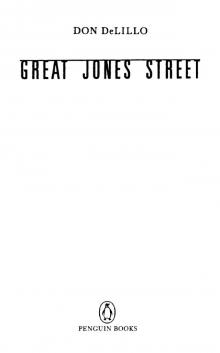 Great Jones Street (Contemporary American Fiction)
Great Jones Street (Contemporary American Fiction)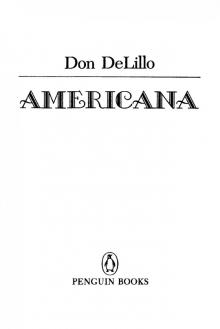 Americana
Americana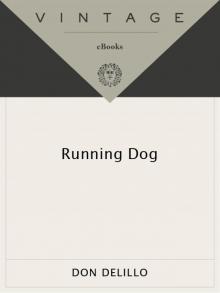 Running Dog
Running Dog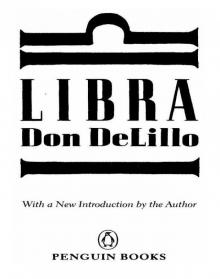 Libra
Libra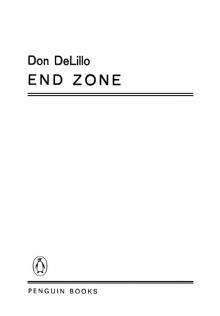 End Zone
End Zone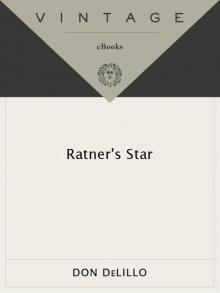 Ratner's Star
Ratner's Star Underworld
Underworld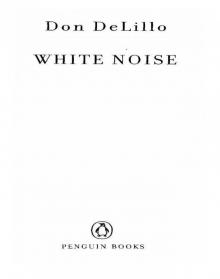 White Noise
White Noise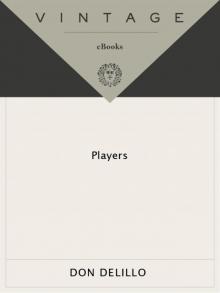 Players
Players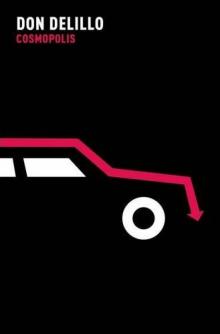 Cosmopolis
Cosmopolis The Silence
The Silence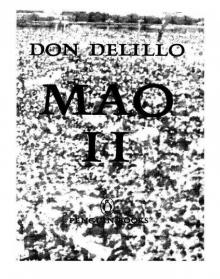 Mao II
Mao II Zero K
Zero K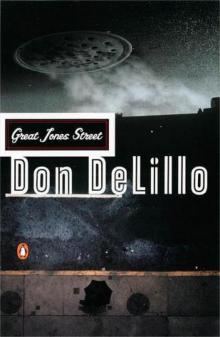 Great Jones Street
Great Jones Street The Angel Esmeralda
The Angel Esmeralda The Names
The Names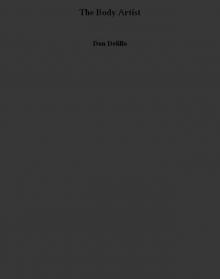 The Body Artist
The Body Artist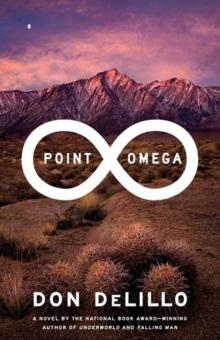 Point Omega
Point Omega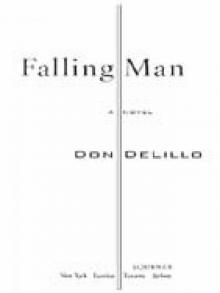 Falling Man
Falling Man